International Business Transaction and Law Assignment - Spring 2019
VerifiedAdded on 2022/09/14
|6
|1673
|27
Homework Assignment
AI Summary
This assignment analyzes a case involving Green Star Petroleum and Mid-Eastern Oil, focusing on international business law principles. The solution addresses the applicability of the International Convention on the Sale of Goods (CISG), particularly Article 6, and its impact on contract binding. It explains the Free Carrier (FCA) rule, differentiating it from Free on Board (FOB) and assessing Green Star's responsibilities. The assignment further examines a Force Majeure event—the capture of a ship by the Iranian Navy—and its implications under the FCA rule, concluding that Green Star is not liable for payment. The Amended Hague Rules (Hague-Visby Rules) are also discussed, along with the defense of perils of the sea. The solution provides references to relevant case laws and legislation to support the analysis.
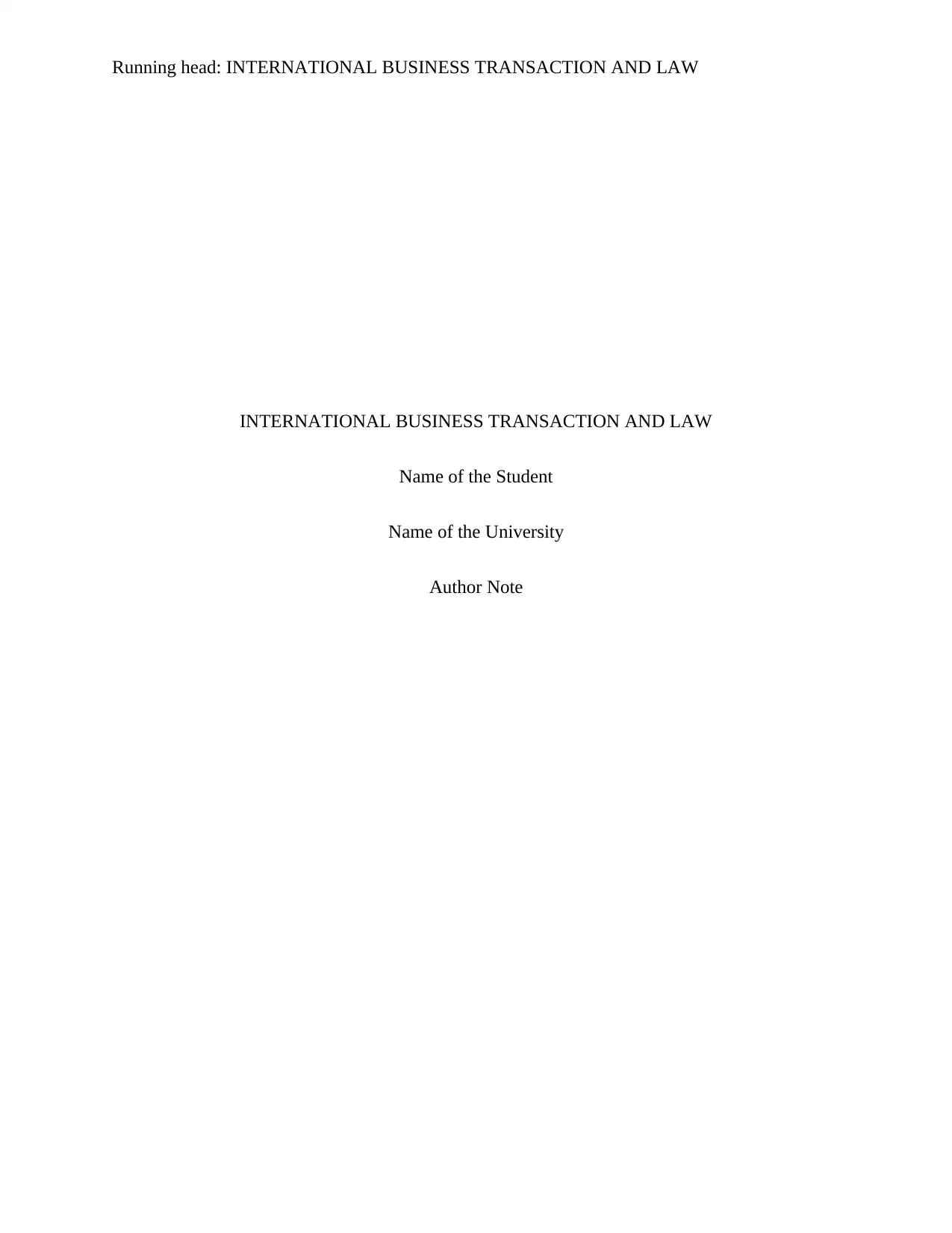
Running head: INTERNATIONAL BUSINESS TRANSACTION AND LAW
INTERNATIONAL BUSINESS TRANSACTION AND LAW
Name of the Student
Name of the University
Author Note
INTERNATIONAL BUSINESS TRANSACTION AND LAW
Name of the Student
Name of the University
Author Note
Paraphrase This Document
Need a fresh take? Get an instant paraphrase of this document with our AI Paraphraser
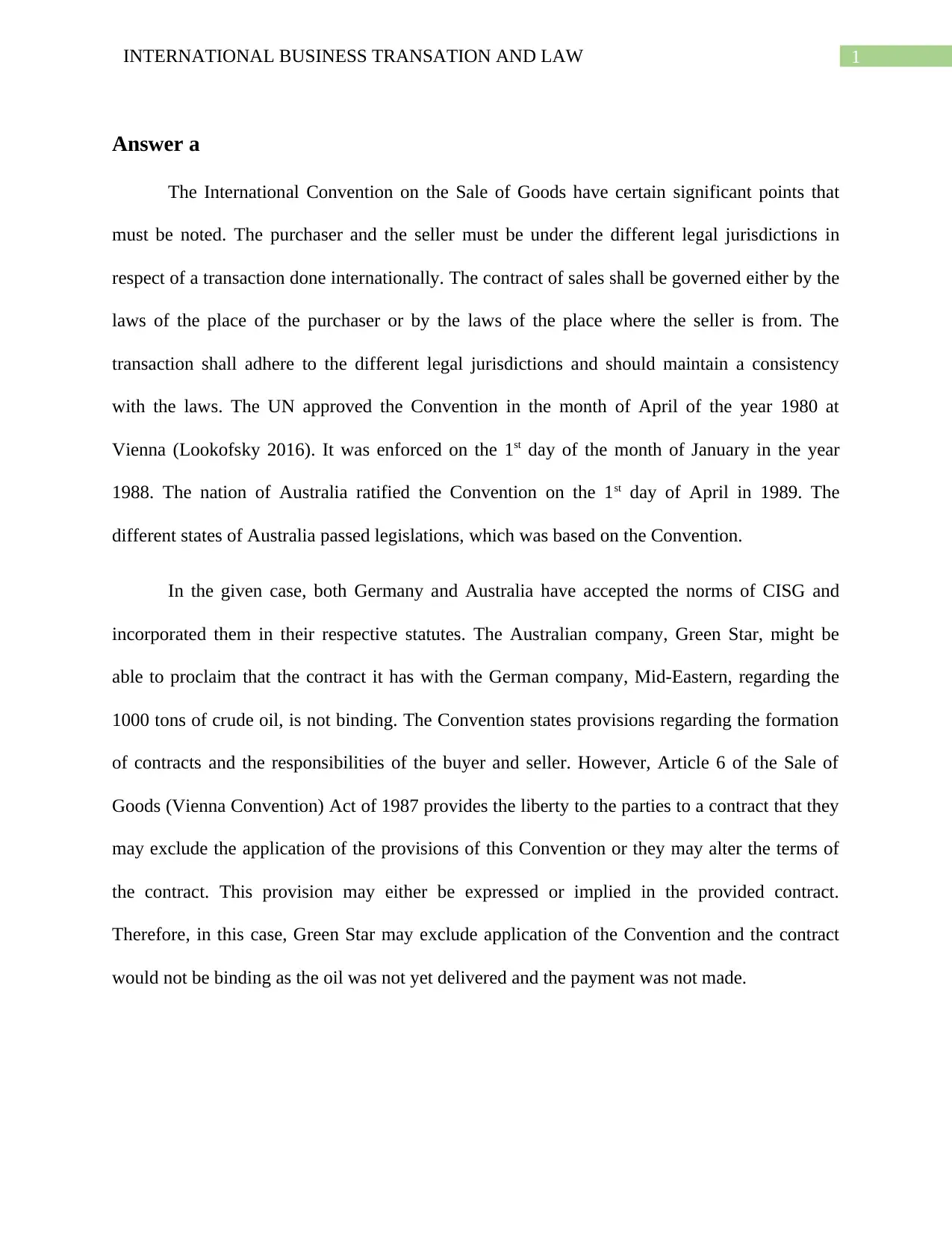
1INTERNATIONAL BUSINESS TRANSATION AND LAW
Answer a
The International Convention on the Sale of Goods have certain significant points that
must be noted. The purchaser and the seller must be under the different legal jurisdictions in
respect of a transaction done internationally. The contract of sales shall be governed either by the
laws of the place of the purchaser or by the laws of the place where the seller is from. The
transaction shall adhere to the different legal jurisdictions and should maintain a consistency
with the laws. The UN approved the Convention in the month of April of the year 1980 at
Vienna (Lookofsky 2016). It was enforced on the 1st day of the month of January in the year
1988. The nation of Australia ratified the Convention on the 1st day of April in 1989. The
different states of Australia passed legislations, which was based on the Convention.
In the given case, both Germany and Australia have accepted the norms of CISG and
incorporated them in their respective statutes. The Australian company, Green Star, might be
able to proclaim that the contract it has with the German company, Mid-Eastern, regarding the
1000 tons of crude oil, is not binding. The Convention states provisions regarding the formation
of contracts and the responsibilities of the buyer and seller. However, Article 6 of the Sale of
Goods (Vienna Convention) Act of 1987 provides the liberty to the parties to a contract that they
may exclude the application of the provisions of this Convention or they may alter the terms of
the contract. This provision may either be expressed or implied in the provided contract.
Therefore, in this case, Green Star may exclude application of the Convention and the contract
would not be binding as the oil was not yet delivered and the payment was not made.
Answer a
The International Convention on the Sale of Goods have certain significant points that
must be noted. The purchaser and the seller must be under the different legal jurisdictions in
respect of a transaction done internationally. The contract of sales shall be governed either by the
laws of the place of the purchaser or by the laws of the place where the seller is from. The
transaction shall adhere to the different legal jurisdictions and should maintain a consistency
with the laws. The UN approved the Convention in the month of April of the year 1980 at
Vienna (Lookofsky 2016). It was enforced on the 1st day of the month of January in the year
1988. The nation of Australia ratified the Convention on the 1st day of April in 1989. The
different states of Australia passed legislations, which was based on the Convention.
In the given case, both Germany and Australia have accepted the norms of CISG and
incorporated them in their respective statutes. The Australian company, Green Star, might be
able to proclaim that the contract it has with the German company, Mid-Eastern, regarding the
1000 tons of crude oil, is not binding. The Convention states provisions regarding the formation
of contracts and the responsibilities of the buyer and seller. However, Article 6 of the Sale of
Goods (Vienna Convention) Act of 1987 provides the liberty to the parties to a contract that they
may exclude the application of the provisions of this Convention or they may alter the terms of
the contract. This provision may either be expressed or implied in the provided contract.
Therefore, in this case, Green Star may exclude application of the Convention and the contract
would not be binding as the oil was not yet delivered and the payment was not made.
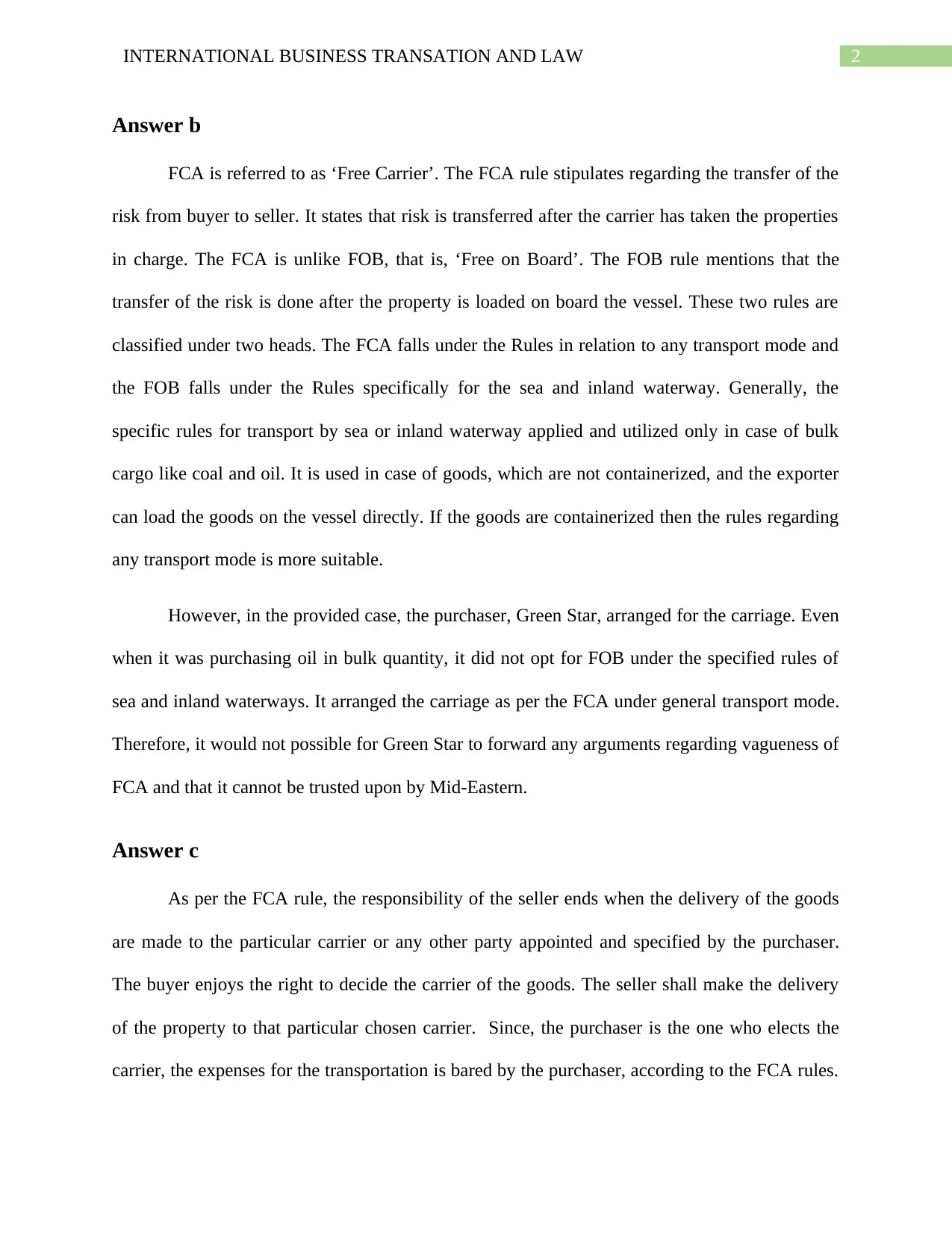
2INTERNATIONAL BUSINESS TRANSATION AND LAW
Answer b
FCA is referred to as ‘Free Carrier’. The FCA rule stipulates regarding the transfer of the
risk from buyer to seller. It states that risk is transferred after the carrier has taken the properties
in charge. The FCA is unlike FOB, that is, ‘Free on Board’. The FOB rule mentions that the
transfer of the risk is done after the property is loaded on board the vessel. These two rules are
classified under two heads. The FCA falls under the Rules in relation to any transport mode and
the FOB falls under the Rules specifically for the sea and inland waterway. Generally, the
specific rules for transport by sea or inland waterway applied and utilized only in case of bulk
cargo like coal and oil. It is used in case of goods, which are not containerized, and the exporter
can load the goods on the vessel directly. If the goods are containerized then the rules regarding
any transport mode is more suitable.
However, in the provided case, the purchaser, Green Star, arranged for the carriage. Even
when it was purchasing oil in bulk quantity, it did not opt for FOB under the specified rules of
sea and inland waterways. It arranged the carriage as per the FCA under general transport mode.
Therefore, it would not possible for Green Star to forward any arguments regarding vagueness of
FCA and that it cannot be trusted upon by Mid-Eastern.
Answer c
As per the FCA rule, the responsibility of the seller ends when the delivery of the goods
are made to the particular carrier or any other party appointed and specified by the purchaser.
The buyer enjoys the right to decide the carrier of the goods. The seller shall make the delivery
of the property to that particular chosen carrier. Since, the purchaser is the one who elects the
carrier, the expenses for the transportation is bared by the purchaser, according to the FCA rules.
Answer b
FCA is referred to as ‘Free Carrier’. The FCA rule stipulates regarding the transfer of the
risk from buyer to seller. It states that risk is transferred after the carrier has taken the properties
in charge. The FCA is unlike FOB, that is, ‘Free on Board’. The FOB rule mentions that the
transfer of the risk is done after the property is loaded on board the vessel. These two rules are
classified under two heads. The FCA falls under the Rules in relation to any transport mode and
the FOB falls under the Rules specifically for the sea and inland waterway. Generally, the
specific rules for transport by sea or inland waterway applied and utilized only in case of bulk
cargo like coal and oil. It is used in case of goods, which are not containerized, and the exporter
can load the goods on the vessel directly. If the goods are containerized then the rules regarding
any transport mode is more suitable.
However, in the provided case, the purchaser, Green Star, arranged for the carriage. Even
when it was purchasing oil in bulk quantity, it did not opt for FOB under the specified rules of
sea and inland waterways. It arranged the carriage as per the FCA under general transport mode.
Therefore, it would not possible for Green Star to forward any arguments regarding vagueness of
FCA and that it cannot be trusted upon by Mid-Eastern.
Answer c
As per the FCA rule, the responsibility of the seller ends when the delivery of the goods
are made to the particular carrier or any other party appointed and specified by the purchaser.
The buyer enjoys the right to decide the carrier of the goods. The seller shall make the delivery
of the property to that particular chosen carrier. Since, the purchaser is the one who elects the
carrier, the expenses for the transportation is bared by the purchaser, according to the FCA rules.
⊘ This is a preview!⊘
Do you want full access?
Subscribe today to unlock all pages.

Trusted by 1+ million students worldwide
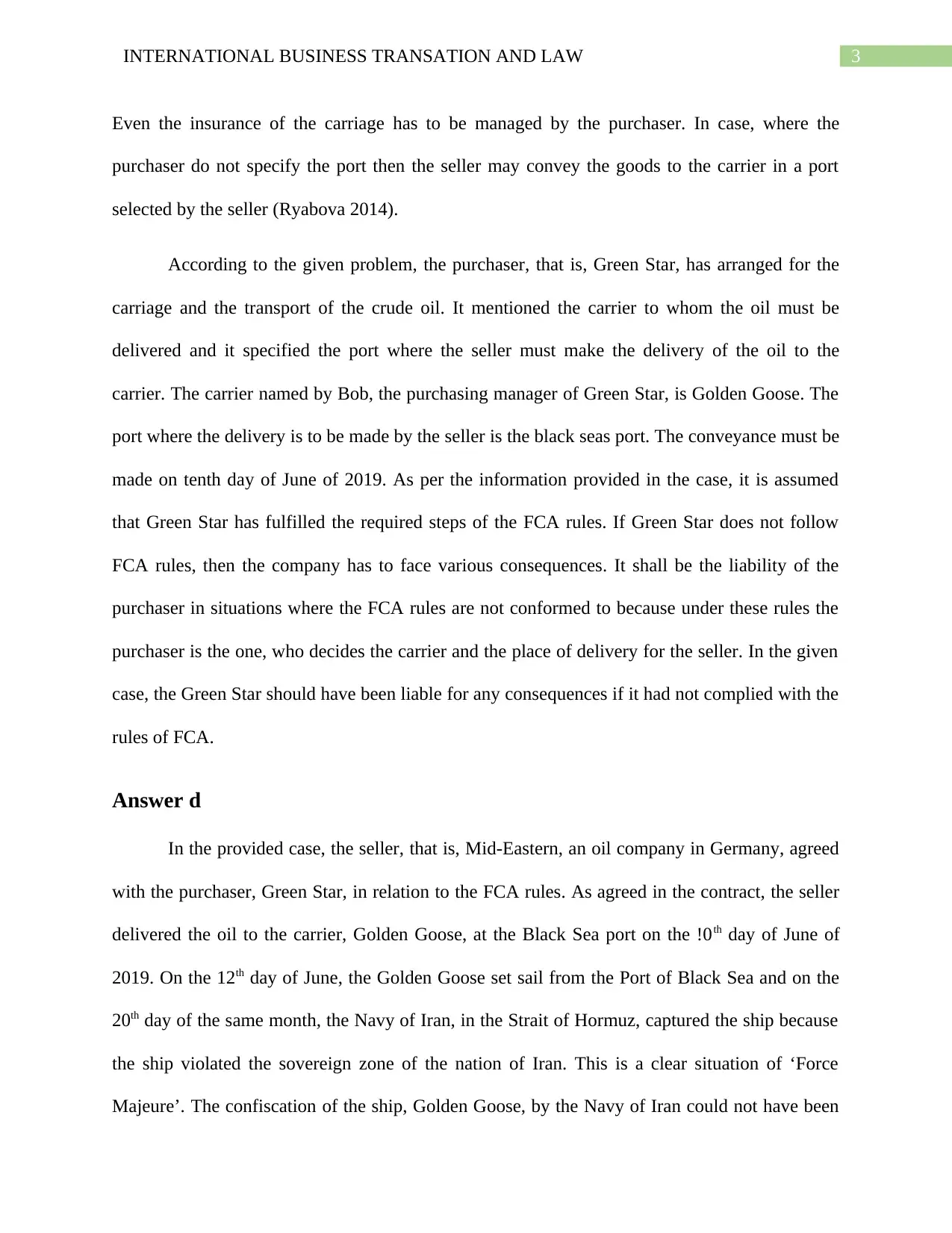
3INTERNATIONAL BUSINESS TRANSATION AND LAW
Even the insurance of the carriage has to be managed by the purchaser. In case, where the
purchaser do not specify the port then the seller may convey the goods to the carrier in a port
selected by the seller (Ryabova 2014).
According to the given problem, the purchaser, that is, Green Star, has arranged for the
carriage and the transport of the crude oil. It mentioned the carrier to whom the oil must be
delivered and it specified the port where the seller must make the delivery of the oil to the
carrier. The carrier named by Bob, the purchasing manager of Green Star, is Golden Goose. The
port where the delivery is to be made by the seller is the black seas port. The conveyance must be
made on tenth day of June of 2019. As per the information provided in the case, it is assumed
that Green Star has fulfilled the required steps of the FCA rules. If Green Star does not follow
FCA rules, then the company has to face various consequences. It shall be the liability of the
purchaser in situations where the FCA rules are not conformed to because under these rules the
purchaser is the one, who decides the carrier and the place of delivery for the seller. In the given
case, the Green Star should have been liable for any consequences if it had not complied with the
rules of FCA.
Answer d
In the provided case, the seller, that is, Mid-Eastern, an oil company in Germany, agreed
with the purchaser, Green Star, in relation to the FCA rules. As agreed in the contract, the seller
delivered the oil to the carrier, Golden Goose, at the Black Sea port on the !0th day of June of
2019. On the 12th day of June, the Golden Goose set sail from the Port of Black Sea and on the
20th day of the same month, the Navy of Iran, in the Strait of Hormuz, captured the ship because
the ship violated the sovereign zone of the nation of Iran. This is a clear situation of ‘Force
Majeure’. The confiscation of the ship, Golden Goose, by the Navy of Iran could not have been
Even the insurance of the carriage has to be managed by the purchaser. In case, where the
purchaser do not specify the port then the seller may convey the goods to the carrier in a port
selected by the seller (Ryabova 2014).
According to the given problem, the purchaser, that is, Green Star, has arranged for the
carriage and the transport of the crude oil. It mentioned the carrier to whom the oil must be
delivered and it specified the port where the seller must make the delivery of the oil to the
carrier. The carrier named by Bob, the purchasing manager of Green Star, is Golden Goose. The
port where the delivery is to be made by the seller is the black seas port. The conveyance must be
made on tenth day of June of 2019. As per the information provided in the case, it is assumed
that Green Star has fulfilled the required steps of the FCA rules. If Green Star does not follow
FCA rules, then the company has to face various consequences. It shall be the liability of the
purchaser in situations where the FCA rules are not conformed to because under these rules the
purchaser is the one, who decides the carrier and the place of delivery for the seller. In the given
case, the Green Star should have been liable for any consequences if it had not complied with the
rules of FCA.
Answer d
In the provided case, the seller, that is, Mid-Eastern, an oil company in Germany, agreed
with the purchaser, Green Star, in relation to the FCA rules. As agreed in the contract, the seller
delivered the oil to the carrier, Golden Goose, at the Black Sea port on the !0th day of June of
2019. On the 12th day of June, the Golden Goose set sail from the Port of Black Sea and on the
20th day of the same month, the Navy of Iran, in the Strait of Hormuz, captured the ship because
the ship violated the sovereign zone of the nation of Iran. This is a clear situation of ‘Force
Majeure’. The confiscation of the ship, Golden Goose, by the Navy of Iran could not have been
Paraphrase This Document
Need a fresh take? Get an instant paraphrase of this document with our AI Paraphraser
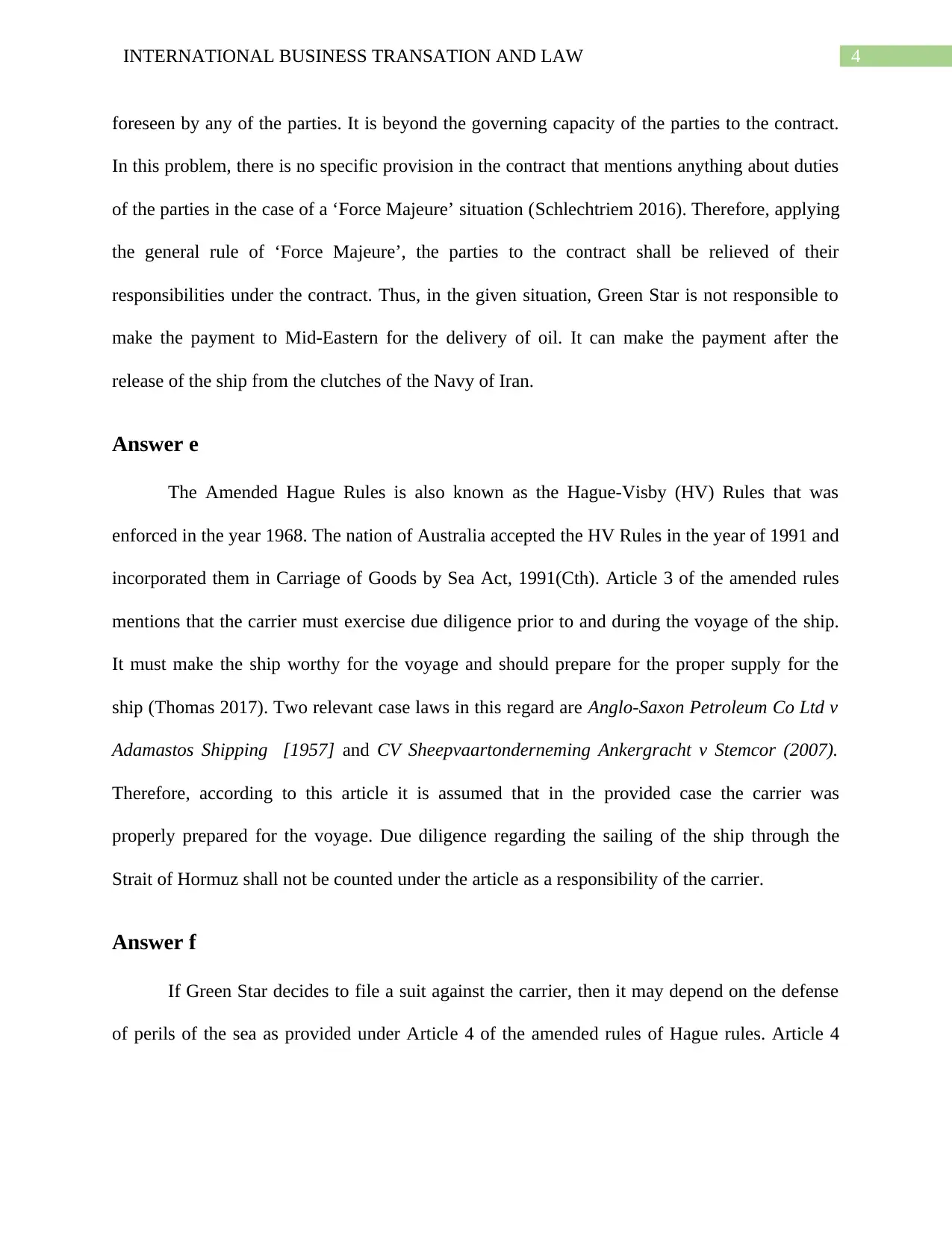
4INTERNATIONAL BUSINESS TRANSATION AND LAW
foreseen by any of the parties. It is beyond the governing capacity of the parties to the contract.
In this problem, there is no specific provision in the contract that mentions anything about duties
of the parties in the case of a ‘Force Majeure’ situation (Schlechtriem 2016). Therefore, applying
the general rule of ‘Force Majeure’, the parties to the contract shall be relieved of their
responsibilities under the contract. Thus, in the given situation, Green Star is not responsible to
make the payment to Mid-Eastern for the delivery of oil. It can make the payment after the
release of the ship from the clutches of the Navy of Iran.
Answer e
The Amended Hague Rules is also known as the Hague-Visby (HV) Rules that was
enforced in the year 1968. The nation of Australia accepted the HV Rules in the year of 1991 and
incorporated them in Carriage of Goods by Sea Act, 1991(Cth). Article 3 of the amended rules
mentions that the carrier must exercise due diligence prior to and during the voyage of the ship.
It must make the ship worthy for the voyage and should prepare for the proper supply for the
ship (Thomas 2017). Two relevant case laws in this regard are Anglo-Saxon Petroleum Co Ltd v
Adamastos Shipping [1957] and CV Sheepvaartonderneming Ankergracht v Stemcor (2007).
Therefore, according to this article it is assumed that in the provided case the carrier was
properly prepared for the voyage. Due diligence regarding the sailing of the ship through the
Strait of Hormuz shall not be counted under the article as a responsibility of the carrier.
Answer f
If Green Star decides to file a suit against the carrier, then it may depend on the defense
of perils of the sea as provided under Article 4 of the amended rules of Hague rules. Article 4
foreseen by any of the parties. It is beyond the governing capacity of the parties to the contract.
In this problem, there is no specific provision in the contract that mentions anything about duties
of the parties in the case of a ‘Force Majeure’ situation (Schlechtriem 2016). Therefore, applying
the general rule of ‘Force Majeure’, the parties to the contract shall be relieved of their
responsibilities under the contract. Thus, in the given situation, Green Star is not responsible to
make the payment to Mid-Eastern for the delivery of oil. It can make the payment after the
release of the ship from the clutches of the Navy of Iran.
Answer e
The Amended Hague Rules is also known as the Hague-Visby (HV) Rules that was
enforced in the year 1968. The nation of Australia accepted the HV Rules in the year of 1991 and
incorporated them in Carriage of Goods by Sea Act, 1991(Cth). Article 3 of the amended rules
mentions that the carrier must exercise due diligence prior to and during the voyage of the ship.
It must make the ship worthy for the voyage and should prepare for the proper supply for the
ship (Thomas 2017). Two relevant case laws in this regard are Anglo-Saxon Petroleum Co Ltd v
Adamastos Shipping [1957] and CV Sheepvaartonderneming Ankergracht v Stemcor (2007).
Therefore, according to this article it is assumed that in the provided case the carrier was
properly prepared for the voyage. Due diligence regarding the sailing of the ship through the
Strait of Hormuz shall not be counted under the article as a responsibility of the carrier.
Answer f
If Green Star decides to file a suit against the carrier, then it may depend on the defense
of perils of the sea as provided under Article 4 of the amended rules of Hague rules. Article 4
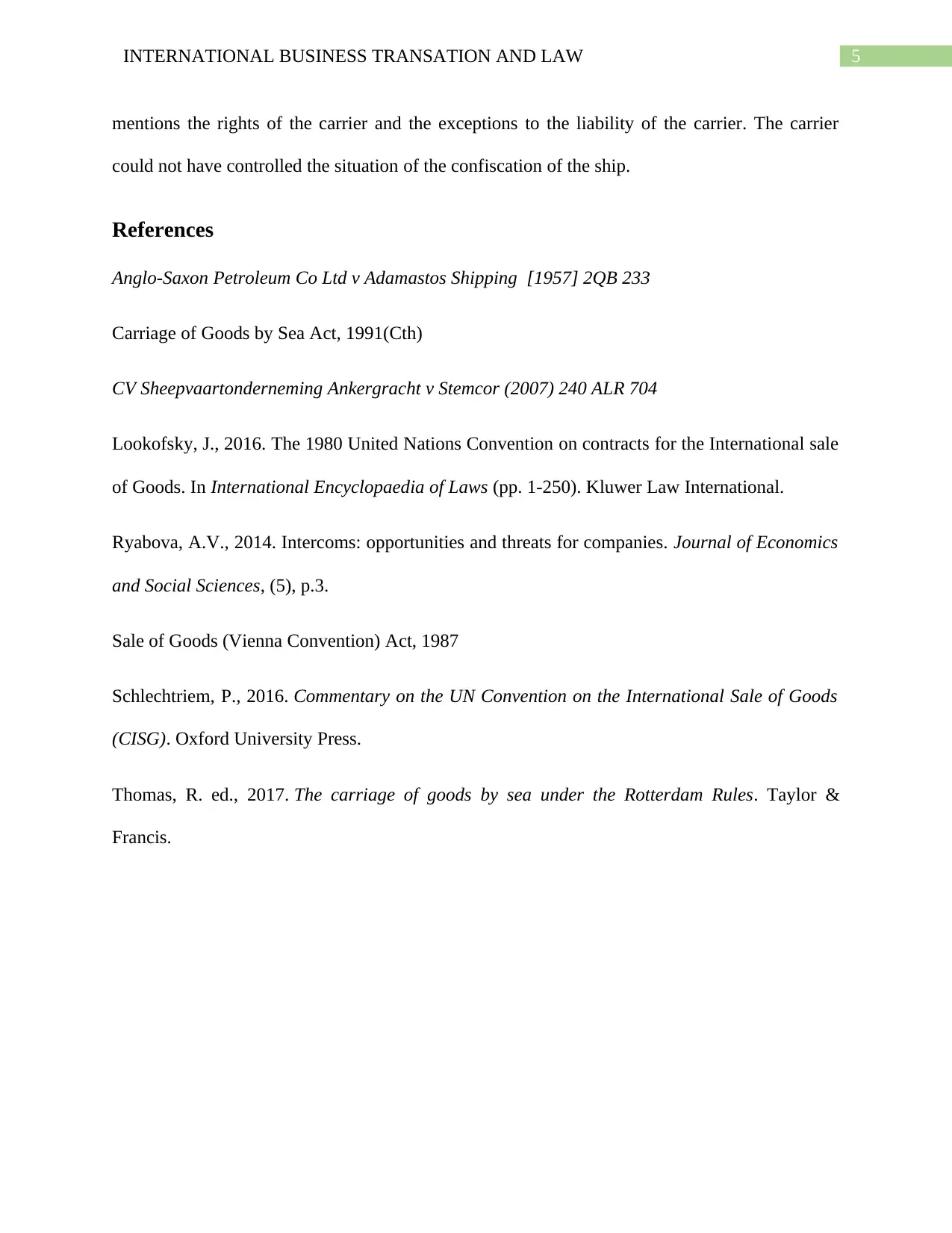
5INTERNATIONAL BUSINESS TRANSATION AND LAW
mentions the rights of the carrier and the exceptions to the liability of the carrier. The carrier
could not have controlled the situation of the confiscation of the ship.
References
Anglo-Saxon Petroleum Co Ltd v Adamastos Shipping [1957] 2QB 233
Carriage of Goods by Sea Act, 1991(Cth)
CV Sheepvaartonderneming Ankergracht v Stemcor (2007) 240 ALR 704
Lookofsky, J., 2016. The 1980 United Nations Convention on contracts for the International sale
of Goods. In International Encyclopaedia of Laws (pp. 1-250). Kluwer Law International.
Ryabova, A.V., 2014. Intercoms: opportunities and threats for companies. Journal of Economics
and Social Sciences, (5), p.3.
Sale of Goods (Vienna Convention) Act, 1987
Schlechtriem, P., 2016. Commentary on the UN Convention on the International Sale of Goods
(CISG). Oxford University Press.
Thomas, R. ed., 2017. The carriage of goods by sea under the Rotterdam Rules. Taylor &
Francis.
mentions the rights of the carrier and the exceptions to the liability of the carrier. The carrier
could not have controlled the situation of the confiscation of the ship.
References
Anglo-Saxon Petroleum Co Ltd v Adamastos Shipping [1957] 2QB 233
Carriage of Goods by Sea Act, 1991(Cth)
CV Sheepvaartonderneming Ankergracht v Stemcor (2007) 240 ALR 704
Lookofsky, J., 2016. The 1980 United Nations Convention on contracts for the International sale
of Goods. In International Encyclopaedia of Laws (pp. 1-250). Kluwer Law International.
Ryabova, A.V., 2014. Intercoms: opportunities and threats for companies. Journal of Economics
and Social Sciences, (5), p.3.
Sale of Goods (Vienna Convention) Act, 1987
Schlechtriem, P., 2016. Commentary on the UN Convention on the International Sale of Goods
(CISG). Oxford University Press.
Thomas, R. ed., 2017. The carriage of goods by sea under the Rotterdam Rules. Taylor &
Francis.
⊘ This is a preview!⊘
Do you want full access?
Subscribe today to unlock all pages.

Trusted by 1+ million students worldwide
1 out of 6
Your All-in-One AI-Powered Toolkit for Academic Success.
+13062052269
info@desklib.com
Available 24*7 on WhatsApp / Email
![[object Object]](/_next/static/media/star-bottom.7253800d.svg)
Unlock your academic potential
Copyright © 2020–2026 A2Z Services. All Rights Reserved. Developed and managed by ZUCOL.


